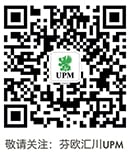Answering to the need for replacing fossil-based virgin raw materials with sustainable alternatives, UPM Raflatac has been an industry frontrunner in developing circular and renewable labelling solutions. A crucial part of transitioning the packaging and labelling industry towards a circular economy is ensuring that the entire value chain operates transparently.
In recognition of a fully traceable supply chain, our factories in Tampere, Finland; Nowa Wies, Poland; Mills River in the US and Changshu, China, along with nine distribution terminals worldwide, have been presented with the International Sustainability and Carbon Certification Scheme ISCC PLUS sustainability certification.
“As a globally recognised high-quality certification scheme for biobased and circular plastic, ISCC PLUS provides us with external proof that value chains for both our renewable and recycled raw materials are fully traceable and companies in these value chains meet environmental and social standards. This strengthens our leadership in the field and supports the sustainability goals of our customers and brand owners,” says Oona Koski, Sustainability Manager at UPM Raflatac.
Renewable and recycled alternatives
UPM Raflatac’s products—including the wood-based Forest Film material and the first ever polypropylene label material with recycled content—have previously been certified according to the ISCC PLUS Scheme.
“When introducing new renewable and recycled raw materials to the market, it is important that we understand the feedstock and have an assurance mechanism in place for responsible sourcing. The ISCC OLUS certification is based on a mass balance approach, meaning that we use biobased and recycled alternatives to replace an equivalent amount of virgin fossil resources in the production process,” Koski explains.
In the case of our UPM Raflatac Forest FilmTM product, Koski highlights the significance of UPM Raflatac joining forces with UPM Biofuels as an example of the cooperation needed to establish a transparent value chain. Manufactured using the UPM BioVerno naphtha, a 100% wood-based solution made from a residue of the pulp production process, the label material provides an identical performance to the standard product but with a lower environmental footprint.
An industry first
Another outcome of our efforts to innovate a future beyond fossils are the UPM Raflatac plastic film labels with recycled content. Developed together with the chemical company SABIC, they are the first of their kind to be manufactured from post-consumer recycled plastic. Chemical recycling turns plastic polymers back into their original molecules, which can then be reformed into polypropylene, a material equal to those made from virgin raw materials.
“Developing chemical recycling for expanding raw material streams is a critical step towards a circular economy for plastics. This product is an example of the need to team up with the right partners to achieve this ambitious goal,” Koski concludes.
